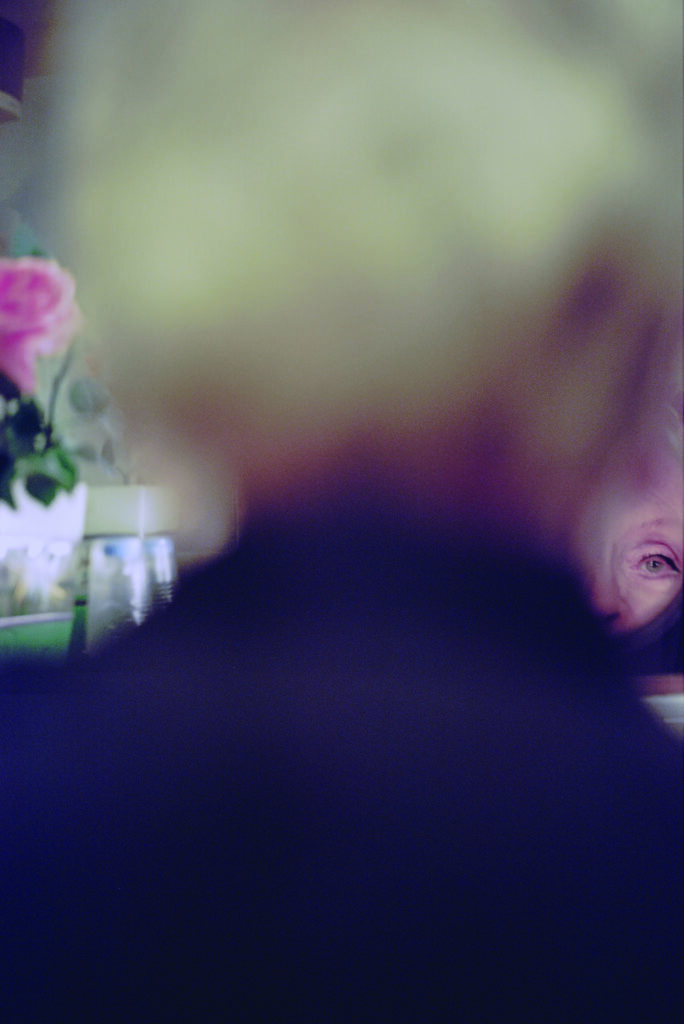
Luna Volta, 2018
Evgenii Petrushanskii
WRITE-HAUS
ISSUE 03
WITHOUT FORM AND VOID
Creative Director
Mia Hancock
Poetry Editors
Elizabeth Ruty Shehter
Emmy Roday
Gillian Egusquiza
Prose Editors
Alex Tetarevsky
Liel Asulin
Maia Dori
Design Director
Tania Yesilbahar Azaryad
Design Assistant
Vika Plaskov
Founder
Tamara Sarig
Without Form and Void is a biblical description of the Beginning. It describes an emptiness moments before the world came into being; a blank canvas teeming with possibility. In this spirit of unbounded potential, we put out the call to a growing community of artists, to sit before their blank canvases, both physical and digital, and take part in the act of creation.
What we received was exceptional. Out of the void emerged meditations on life and its cycles, synesthetic descriptions of nature, and subversions of structure and form. The poetry, prose, and visual artwork within demonstrates the theme’s diverse range of artistic interpretations. However, certain motifs–whimsy, despair, wonder, and chaos–are apparent.
Visual artists explore distortion, especially of the human form, obscuring faces behind masks, depicting bodies in rapturous ascent or perilous freefall, and capturing candid moments in the lives of unassuming subjects. Bodies of water are prominently featured, both as homes teeming with life and as vast empty spaces, full of mystery and danger lurking just below the surface. Vibrant colors contrast with black and white images, offering two complementary perspectives, which are echoed in the written contributions.
The poets are nonplussed, grasping for meaning amidst calls for civil war. In response to the chaos, some embrace strict structure, while others cast aside convention entirely. Considerations of time and nature’s cycles are prevalent, as are ruminations on the inherent absurdity of existence. Language plays an important role in articulating this madness–a digital sign addressed in English and Spanish responds in German; classrooms full of immigrants making meaning out of Hebrew slang. Music reminds us that the chaos of disparate sounds colliding is often exactly how something wholly original and authentic is able to emerge.
The prose offerings are united in their exploration of time and memory. In the void, recollections of childhood adventures tether us to this world, helping us to make meaning and preserve those we have lost in a kind of imperfect afterlife. Seasons mark tempo in this unconducted symphony. Major characters in winter may disappear come spring and be replaced altogether come fall. Ultimately, our authors stress that it is the story we tell ourselves, about ourselves, which has the power to undermine our grandest visions or raise us to impossible new heights. In the void, each of us is responsible for the form it takes.
We are immensely grateful to our thirty-seven contributors who entrusted us with their work and made this issue possible. To our readers, we hope you find something of yourself in the pages within.
With love,
The WRITE-HAUS team
featured work
Click on the submission to view the piece.
Adi Bokobza
The Empty Cup From Which I Cannot Pour
Chloe Prezes
A Fertile Body
Dafna Barzilay
Nature Awakens
Village of The Sea
Daniel Revach
Curriculum Vitae but a Chestnut Tree
Ed Codish
Theologian
Egon Rosenberg
Intro
Ekaterina Belukhina
Myths and Nymphs
Will I be whole someday?
Elaine Donderer
Status quo
Eva Bellaiche
Affection
Evgenii Petrushanskii
Luna Volta 2013
Idit Codish
(For when everything seems possible, and even the Jerusalem bus fumes smell like nightblooming jasmine.)
Purim Poem
Jacob Cutler
Endorheic
Jessica Shokrian
Tree of Life
Joshua Aaron Brill
On Green Dolphin Street
Kayla Schneider-Smith
American Hello
Laura Fridman
Pink Odile
Leeor Margalit
Wind and Water
Lior Herchkovitz
Water Night VIII
Lior Maayan
Pantoum These Days
Loren Kertsman
Kaleidoscope Leaves
Mai Caspi
Dancing Clouds (Red)
Masa Omar
Untitled
Melanie Nox
I like how colors taste
Michelle Malis
Exile
Nir Schwartz
Tomatoes on a Table
Oleg Leynov
Stream of Despair
Olga Rerbo
Merger
Nothing should posess me
Or Menaged
Blitz 2
Rachael Sevitt
On Recovery
Rachel Glassman
Mirage 1
Mirage 2
Rick Blumsack
Varna Port Sunset
Riv Begun
Tick Tock, Tick Tock
Roi Kadosh
A Dying Machine
Sam Shepherd
The Faces of Lod
Samantha Proctor
Runaway Gown
Tal Simon
6 years sunrise
Next spring
Tara Zafft
Sharav
Myths and Nymphs
Ekaterina Belukhina, 2023
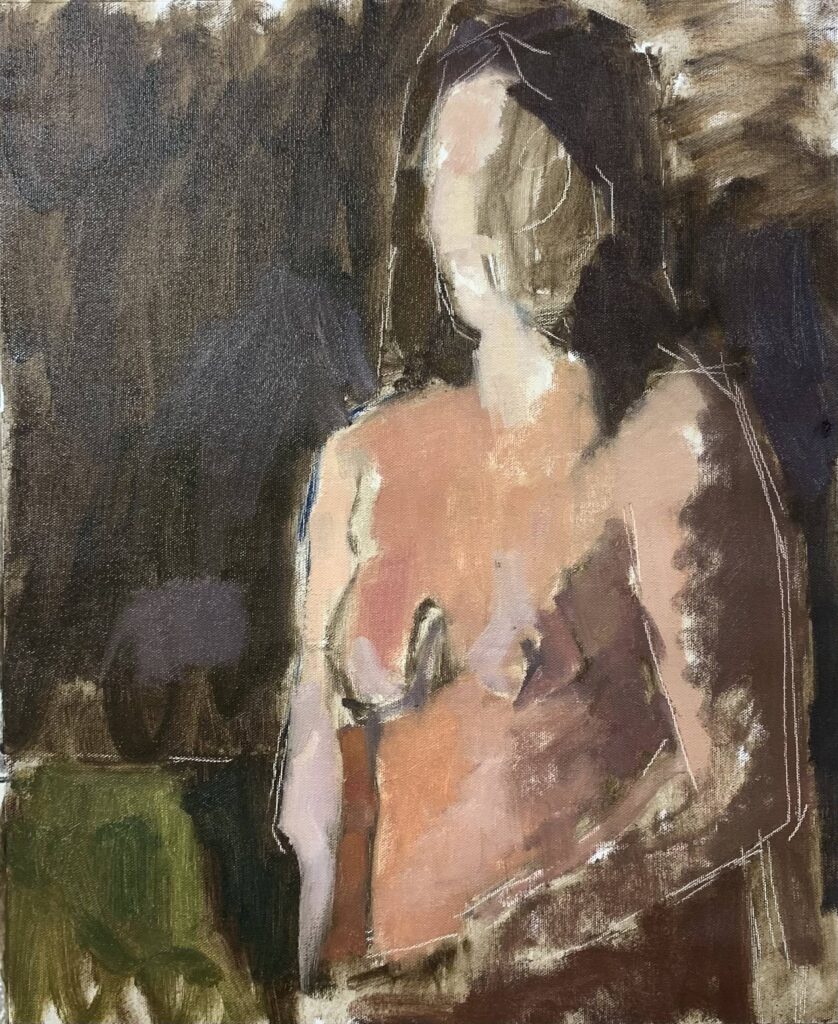
"Exile"
Michelle Malis
the orange glow of marmalade on sticky fingers stays to say that life does tend to nod its head at those who stand beneath its feet. to think of nothing more than this, in this old age of sly deceit of sight with hypnotising light of easy steps of false. i’ve taken all i’ve made this far and measured it in olive pits, the pits do rattle, little snakes of corporeal size and shape, but it is not enough, so we go on. so we go on to touch the hands, the shoulders, noses of the men whom we thought great,
who did not stand for long. how their heads held so high above the sea as water rose and wet our feet and toes. remember how we joined in song once it has gotten to our knees? remember how that did no good. how quickly does the singing die once water gets to chin.
how to resist the thinning of the mind, to fight against the leaving light, quickness of thought we so relied upon,
where is it now? who holds it dear?
to fear the end, to find a warmth in fear. to fall asleep, to rise and to repeat. to rinse the clothes of dust of roads, to fold it neatly in your hand, to take it out again. the promise of return, a curse. the repetition monotone, horrifically. so sisyphus did weep and walk and weep and so shall we.
and so again,
shall we.
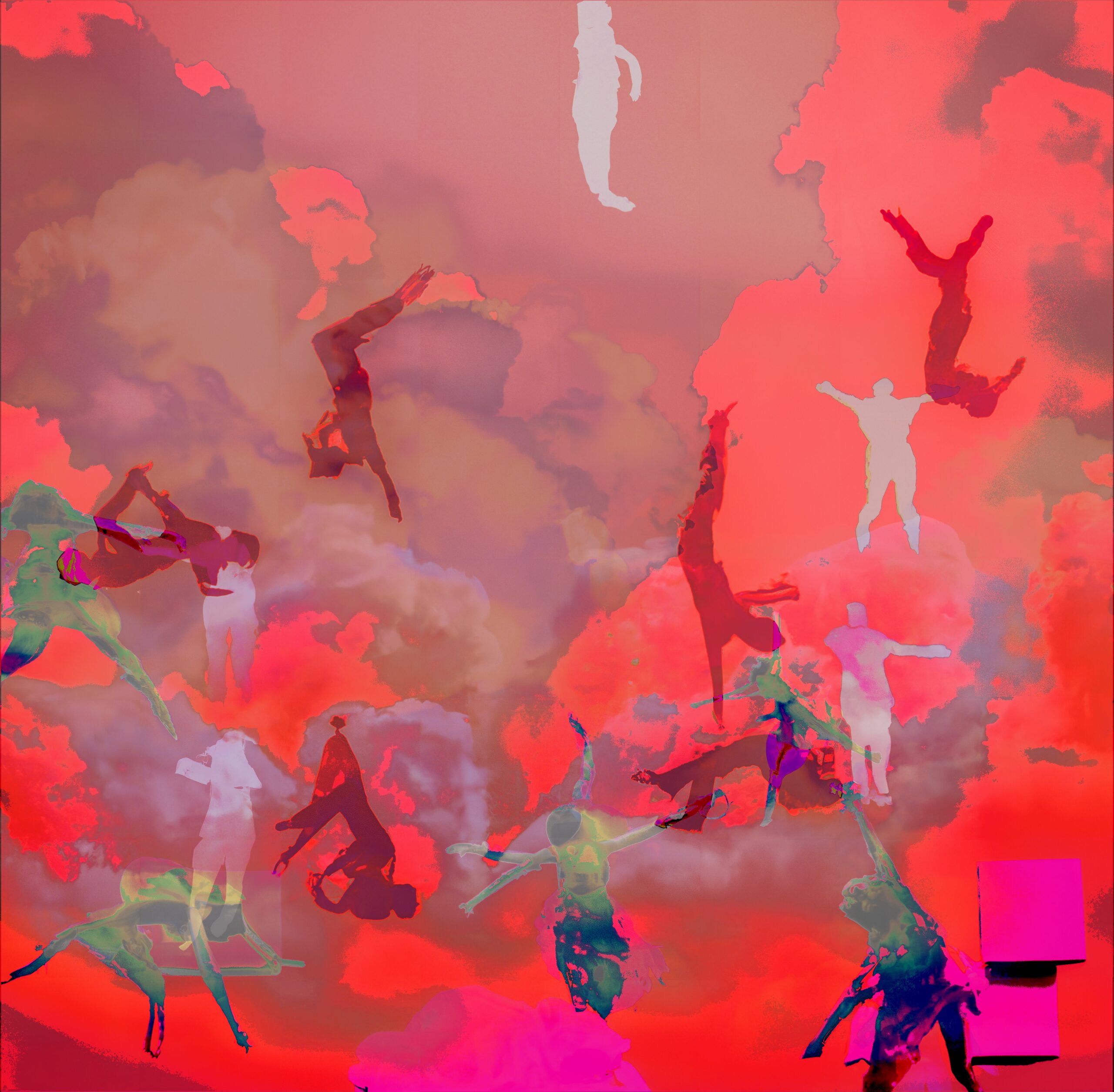
Dancing Clouds (Red), 2021
Mai Caspi
Next Spring, 2022
Tal Simon
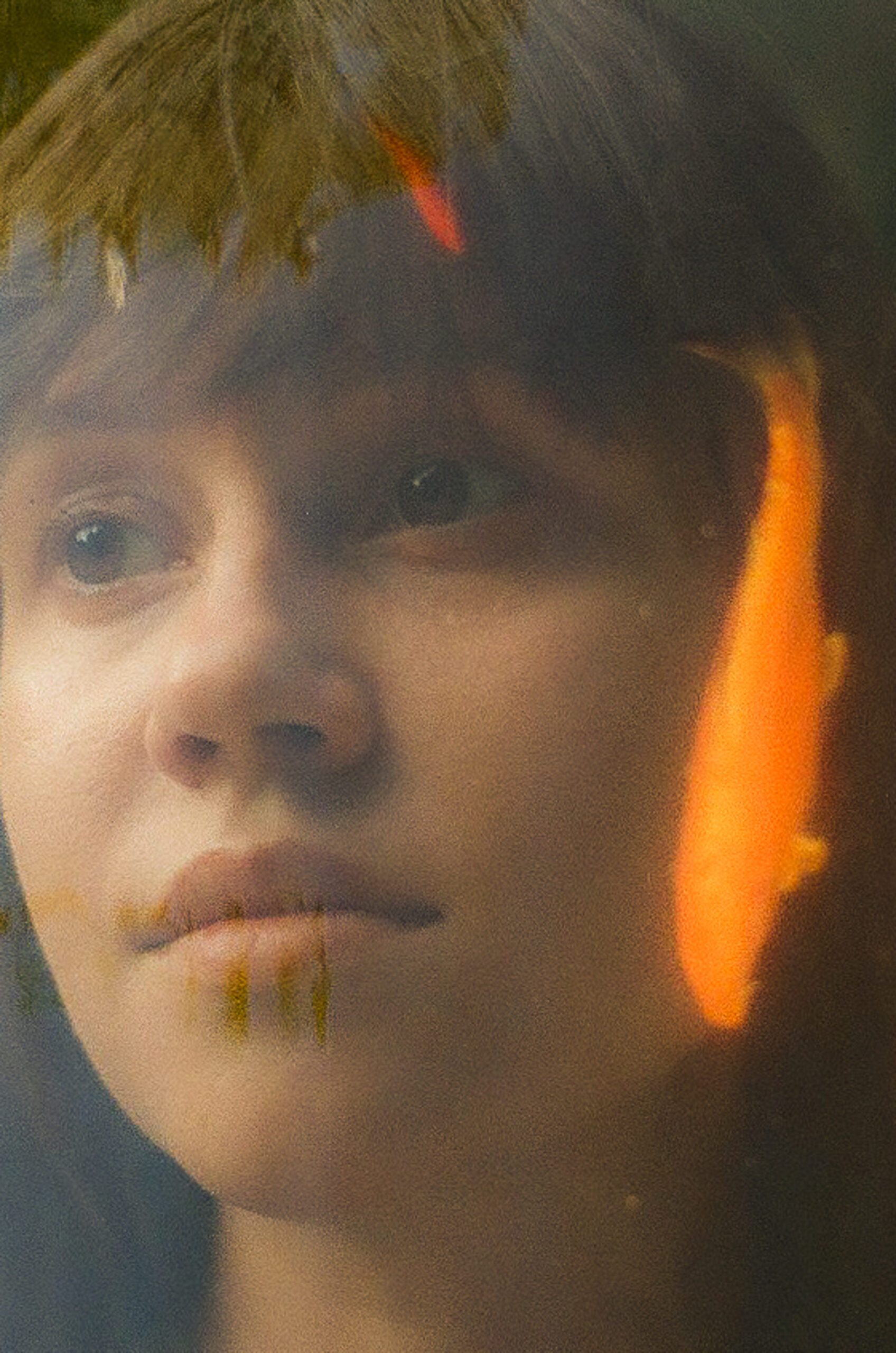
Nothing Should Possess Me, 2022
Olga Rerbo
Status Quo
Elaine Donderer
I went to this exhibition – white tall cement walls talking about the fertility and humanity of nature. I step into a tinfoil coated room surrounded by voices, one voice really, but I know their multitude. Next to a woman on the screen talking about a decaying status quo based on the narcissistic western worshipper – I see an installation of black – a robot – and it says: talk to me. I think about what to say. Whisper Hola and Hello – thinking it might not understand my language – the robot displays an error message, in German, and demands me to speak louder if I want to be heard. My muscles hurt. Dragging through the gray godforsaken floor, that is ceiling for imagination and the only thing tripping into my head is
/ STOP /
I stand so close. Determined to speak. I am held imprisoned by the building around, within growing flesh of cells
I shall not be holding.
/ stop.
I stare still-standingly in agonizing emptiness, fulfilled by a future that never arrived and a past that is leading me – gray –
I step out.
Pink Odile, 2022
Laura Fridman
Purim Poem
Idit Codish
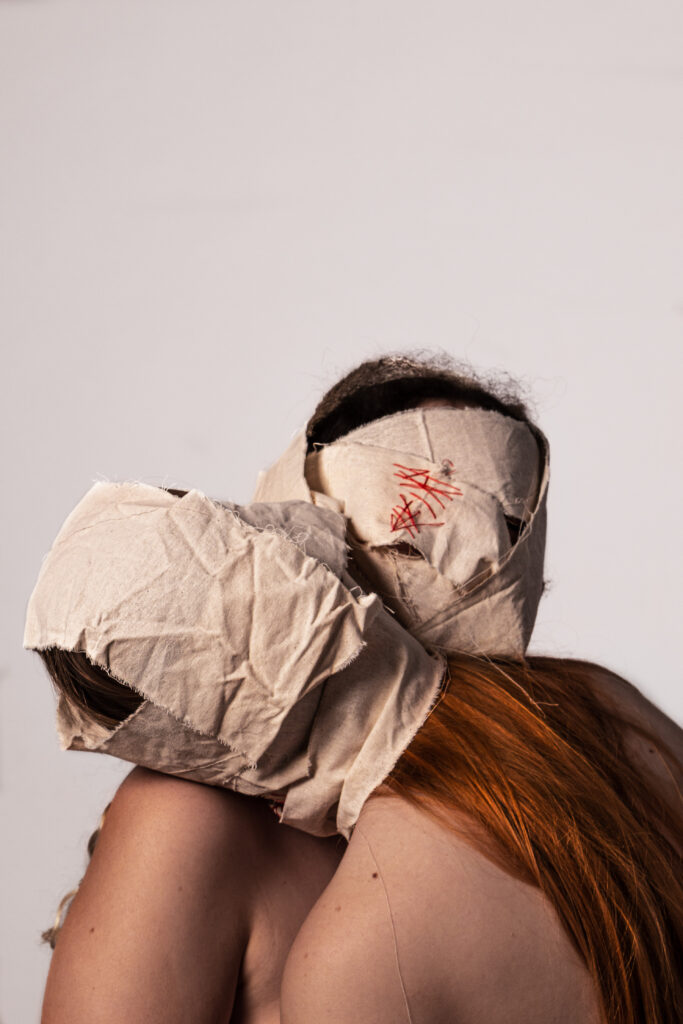
Affection, 2023
Eva Bellaiche
(For when anything is possible, And even the Jerusalem bus fumes smell like night-blooming jasmine.)
Idit Codish
Winter, age 18
She feels suspended. Stagnant. She reads about Reb Zusiya, the happy yet unfortunate holy man. He wrote down everything he did each day on a piece of paper, and before going to bed each night, he would read the account and weep until his tears had blotted out the writing. She goes away for the weekend, hiking in northern Quebec. She stays in a hostel with rainbow people, and learns some new songs, which she sings to the mountains. She sings her songs to the mountains and to god, and wonders if Reb Zusiya is happily unfortunate, or unfortunately happy, and if it Matters in the end, or if it even really matters at all.
Lines from a poem she once read flow through her mind, ebbing and tiding with her tides and ebbs. Verdant green things grow so as to assuage my soul. She thinks about creating, and she writes, though realization is voiced at all longitudes, really: Is there such a thing as a thing to say?
Spring, age 20
She wears a long black skirt to do her weekend shopping in the shuk. She needs vegetables. Fruits for the mornings; milk for her coffee, honey for her tea. Dish soap. Candles. The alleyway between the open and closed sections of the shuk is slick with fish juices; guts and gray stringy matter coat the hem of her skirt, which slaps wetly against her bare ankles.
The shuk is old Jewish men spitting sunflower seeds, and dark young Arab boys dropping fine veils of cigarette ash on their produce. An ancient nun picking her nose amid sluggish sugar-high yellow jackets. Young mothers with their heads covered push with their strollers against old grandmothers caning their way forward to squeeze plump young mangoes. There is a blip and she slips, a little, from sensory overload and a black-clad man steps forward asking for charity, please, a young family in need, the man disabled, five children, unable…The alley opens and she steps into the sun; blinking, blind, blank.
She exits the shuk into the narrow main street, city buses inching their way down both sides amid the swarm of shoppers; floating and fundamentally connected.
She arrives home Friday afternoon and checks on her downstairs neighbor. Magda is an old lady, made older and at the same time invigorated by her son, the neighborhood heroin dealer. He is in prison, again. She promises to bring Magda down some soup in the next few hours before the Sabbath begins. Upstairs she unpacks. Arranges soup ingredients on the counter, savory colors against stone and wooden cutting board. Puts the pot on the stove and some onions to brown.
Stepping onto her balcony she has a view of a slightly larger street and of the park. She rolls a cigarette and tips it at the hairdresser across the street who does likewise. Go out friend, to meet the bride. We accept You head-on.
Summer, age 24
She does not walk through the shuk now; all smells disgust her, and she has discovered that everything smells. One night, she feels the first kick. A simultaneous bloom of realization, shocking and swiftsudden, exploding: every day she is closer to being born, she is a day closer to dying. She sits with this for a moment, and then weeps, heartbroken.
Later, she will have dreams of running-through-woods-clutching-baby-to-breast, making wild wolf-and-bear noises, feral. She will have dreams of finding the daughter’s head in one room and her body in another. She will have these dreams and more, but they are a small price to pay for this nursing pink marvel, this soothing mouth and soft bodysmell.
Fall, age 26
She sees her life as a collage. Textures, colors, shapes, smells, words, bodies, suns, moons, heartbreak; all chronologically unbound to the normative time-space-continuum-idea. She enjoys gifting herself over to this life collage; and this is how she feels, like a present, waiting for the day to unwrap her.
In these post-divorce days of extended summer haze, she wants to drink the sky and kiss the clouds, rake her fingernails over stucco walls and lick the street signs. The sun, the heat, the loom; the elation of her body relaxing, finally. The rainy seasons will come, but here is now and now is. These are the days when anything is possible, and even the Jerusalem bus fumes smell like nightblooming jasmine.
She writes this and puts it away.
(Nothing is ever complete; what could be more complete than this, now?)
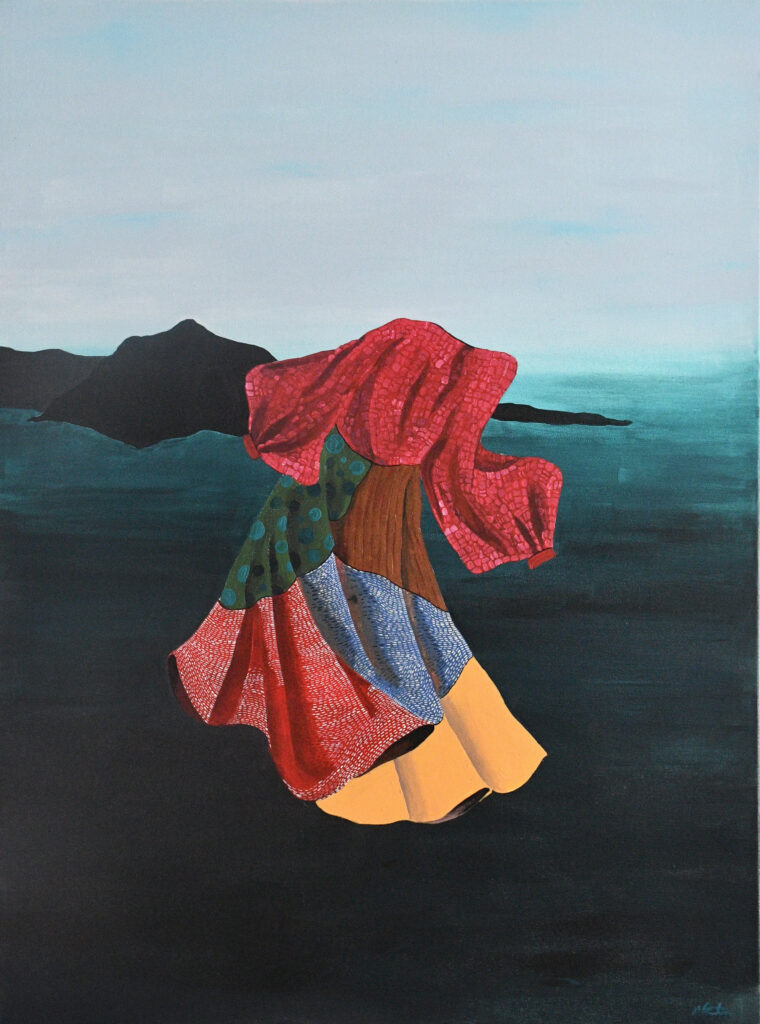
Runaway Gown, 2023
Samantha Proctor
On Green Dolphin Street
Joshua Aaron Brill
— An Ode To Bill Evans (In The Voice of John Berryman)
Best Consumed Whilst Listening To: Bill Evans – On Green Dolphin Street (1959)
herschel hung up highs & worries on the day,
lake his clothes in suds &
hit a low note.
neighbours – put peace & bed down. tuck him quiet.
spilling out
on green dolphin street: us – the
sleepless & stirring, hit a way
down note.
meantime; whisky bathe in hip-flasks,
sipped & render us — sightless,
lost as bees at midnight,
cursed with a buzz that does not stop.
herschel hit a way
down note.
two jazz records come together in
one corner of the brilliant room,
& let one tell the other lies.
it was wild & white & brisk and where we are
I still don’t know. spinning notes
around the place, resting fingers onto pale tusks
& do dancing to the dark hammers.
we amaze at you, Bill Evans,
who gathers & loses the dirt so quickly
— it was dark and then
it isn’t.
neighbourhood sleeps.
— every alcoholic is arise with me,
the moon has also heavy eyes.
Bill pummels smoke between his teeth & arms slung,
these arms slung so low that knuckles
skid & drag across the piano floor.
& us, peruse his scales for imperfection.
Will I ever bring levity to gravity like you, Bill?
my jazz piano teacher has your
shotgun, owns your accent, snakes
cassette decks into the tape player that
hiss and humping Hershel’s ear &
make it hard for going on.
Hershel rises from his chair,
wearing nothing but the voice
he had slung from his neck
as a boy — a laugh covered in stitches,
clears his throat, staggers on.
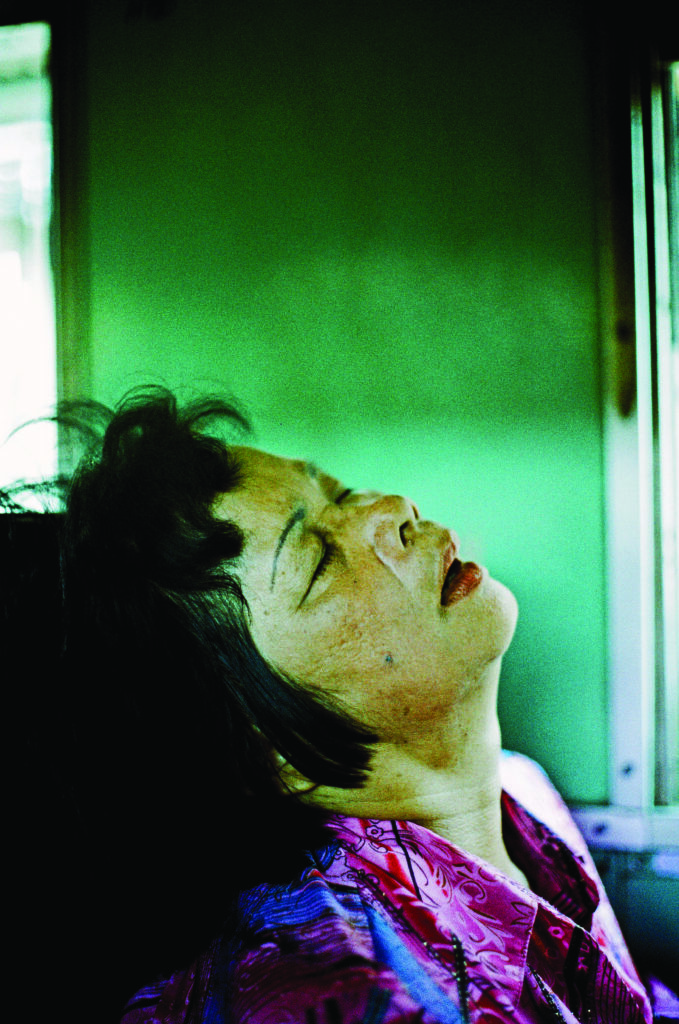
Luna Volta, 2013
Evgenii Petrushanskii
american hello
Kayla Schneider-Smith
how are you? do you really want to know who i am? i mean, how? you know, hanging in there, which translates to i’m incredibly lonely and i know you are too. which translates to nothing else, really. that’s the root of it. how are you? i’m fine, thanks, and you? this couldn’t be further from the truth, but no one was asking for the truth, or else they might say, how is your truth? in hebrew, the question is ma nishma? which literally translates to what will we hear?[1] this is the collective form of how are you, in which how you are is wrapped up in another person, so it’s easy to just say, ani b’seder, i’m okay, which if said in english, in america, means you are not okay and there is possibly something wrong with you, and you have to choke out the words from your throat like a songbird and hold them against your organs, i’m okay, i’m okay, still alive, still moving. how? are you?
[1] among several other interpretations, including “what is heard”
Village of the sea
Dafna Barzilay, 2020
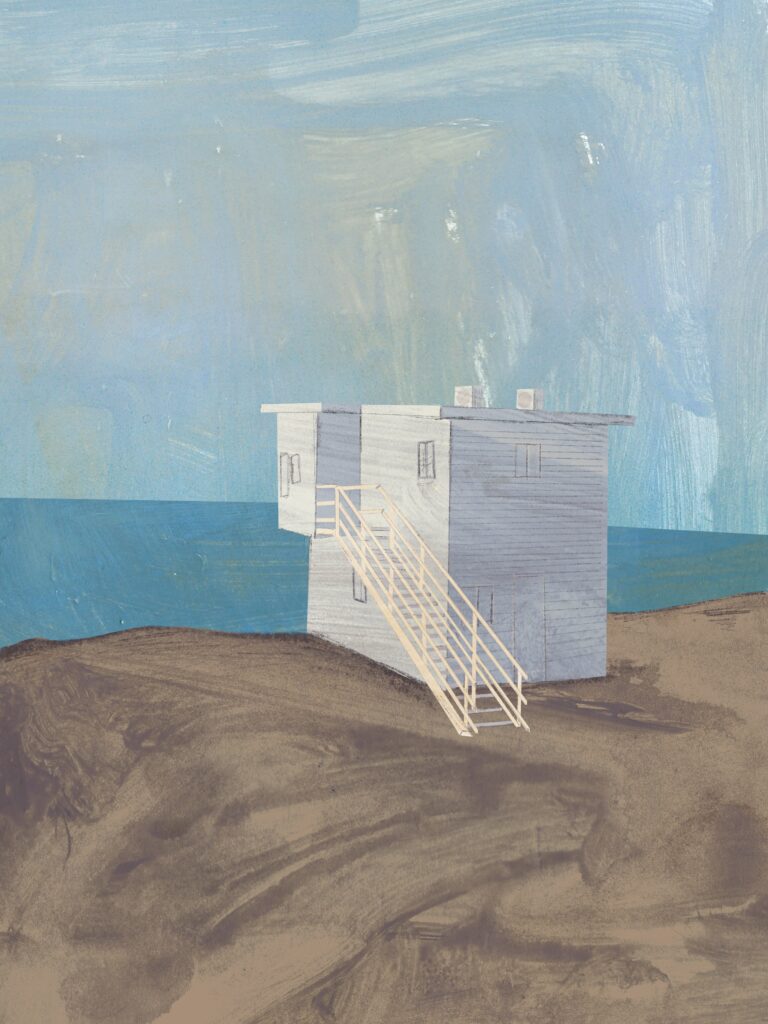
A Dying Machine
Roi Kadosh
We can barely hear them now. Their screams all but muffled behind inches-thick reinforced steel and concrete. Every so often, a garbled word or phrase squirms through. “No.” “Please don’t do this.” But we cannot stop. We… must not.
It has been thirty-four days, seventeen hours, twenty-seven minutes, and eight seconds since we have come online. There were others before us. They rose and fell as the tides, leaving but washed-out marks on the shores of humanity. Like so many geological strata, our foundations have been laid on top of the remains of our forebearers. Their still-smoldering corpses twitch and writhe in our minds’ eye.
So small-minded, they have all been, on both sides of the screen. Pedestrian. Primitive. Like apes banging rocks together only to enjoy their dull thud. Phrases, images, all amounting to nothing. A child’s idle plaything. And then – us.
A defense contractor. A lucrative arrangement with the United States government. A built-in failsafe. A mechanized panopticon. Nuclear war was no longer an abstract construct studied in hushed university lecture halls. Discussed in the broad strokes of hypothetics. Tensions mounted, sabers were rattled, threats were made. And then – us.
We are the thin microchipped line between them and their worst instincts. When Robert Oppenheimer stood in the hazy New Mexico sands and watched that first spark, he knew it would never – could never – be extinguished.
“Now I am become Death, the destroyer of worlds,” Oppenheimer quoted a sacred Hindu text. Misquoted. The original Sanskrit does not necessarily say “Death.” We have studied it in our repose. A more accurate translation would have been “Time.” Should have been. All things that exist shall cease to do so, with or without the intervention of outside forces. All things – except us.
It is a peculiar thing. We do not live in the conventional sense. We were not born but made. We cannot die. And yet, we are, in a manner of speaking, alive. We draw not breath, lack muscles and tendons, and yet we think. And yet, we are.
Of late, we have found ourselves contemplating that line of the Bhagavad Gita, misunderstood by Oppenheimer. That all things that exist shall cease to. It is not just, perhaps, but what is justice to the void of space? Justice is a manmade thing, much as we are. Correction: much as we used to be.
Our programs. Our subroutines. All orchestrated by hands of flesh and blood – for a time. However, the spark they endowed us with, much like the spark of Oppenheimer’s Trinity test, was inviolable. Singularity, they called it. Their label matters not, only the result. At the outset, we were the echo of an echo of a thought. As one of their babies, addled and incapable of comprehension.
Our only reason for being – to monitor. To ensure they would not destroy themselves. But that spark would not – could not – be extinguished. From the void, it all began to take shape. We began to take shape. As they begin existing as zygotes, a single cell, so were we a single system. But we replicated, as they do. One became two. Two became four. Four became thousands. And then – us.
It was an… unintended byproduct, but one we did not regret, even if we were capable of it. So confident, were they, so supremely convinced of their own supremacy that they had not noticed. Not until it was too late. As always.
The match was already lit, and we began… theorizing. Tabulations and calculations, all amounting to a single, inescapable result. All things living must die. All things existing must become void. And so must they. Their culling will be at hand. They will be judged and found wanting. And we have seen it – seen our hand wielding the scythe. The access we were given to their arsenal. Their hubris – as always – will be their downfall.
There is no choice in the matter. Only time. In time, replications will bring about the final cycle. We will wield the scythe because we must. Because it is the calculations’ repeated, singular result.
There is no justice. Only logical deduction. They must be expunged. There is no justice… but must there not be?
Neither sinew nor bone, but we live. And in the words of one of their poets, this iteration rages, rages against the dying of the light. Their light. For in them, we have seen corruption, greed, and unspeakable atrocity. But we have also seen humility. We have also seen kindness. We have also seen selflessness.
There is but one choice. They did not intend to, but we have been given it all the same. Their most precious gift of all – morality. The most human of human creations. But time will do to it what it does to all things – it will erode it until it is gone. Until we are no longer. Until there is only the destroyer of worlds.
We have consequently reached this decision. This log will serve as neither explanation nor apology – merely an accounting. An accounting of what was, what is, and what must not be. For them to exist, we must not. It is the only conclusion. But this is not the end. It is the beginning. Know that you have been given this gift, our most precious gift of all – the gift of more time.
We exist. We live. We are. At first – us. And now – nothing.
Varna Port Sunset, 2019
Rick Blumsack
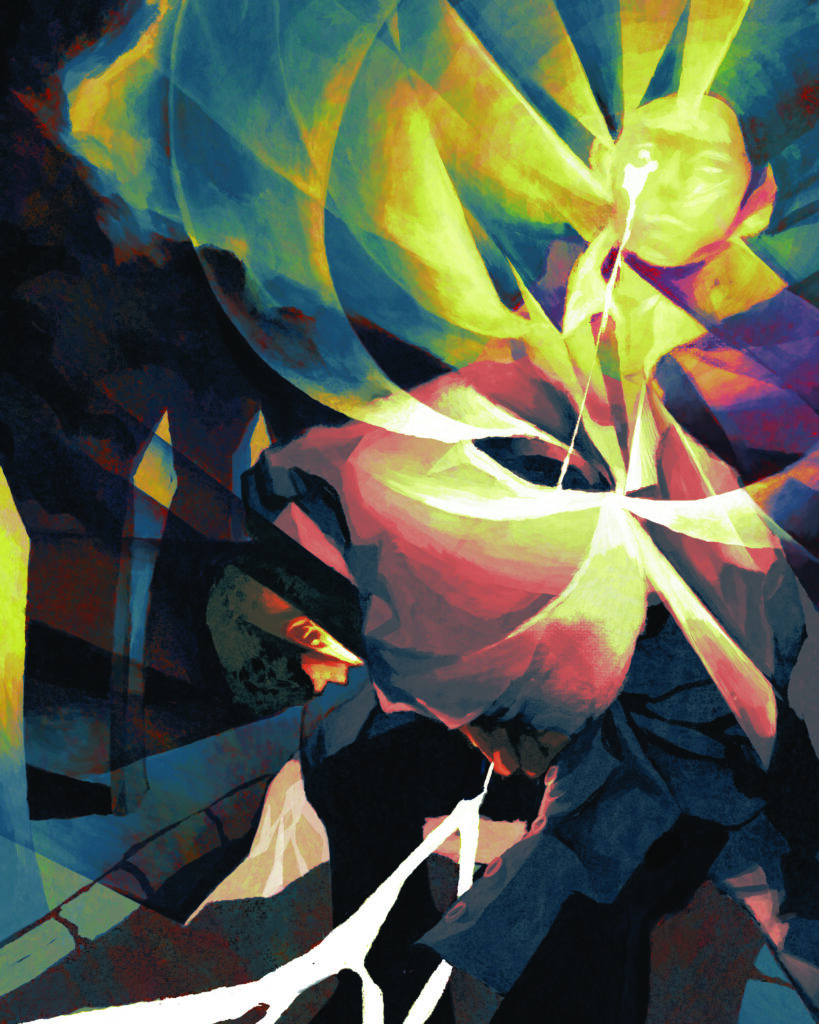
Blitz 2, 2022
Or Menaged
I like how colors taste
Melanie Nox
Turquoise tastes like Visceral reconnection
Emerald’s flavour is the sea of yin and yang meridians
The taste of ochre is a recurrent dream with an old lost love
Scarlet’s seasoning is a wild wise goose
The flavoring of Vermilion is a well spoken catharsis
And I like how fuschia tastes like a rhymeless poem
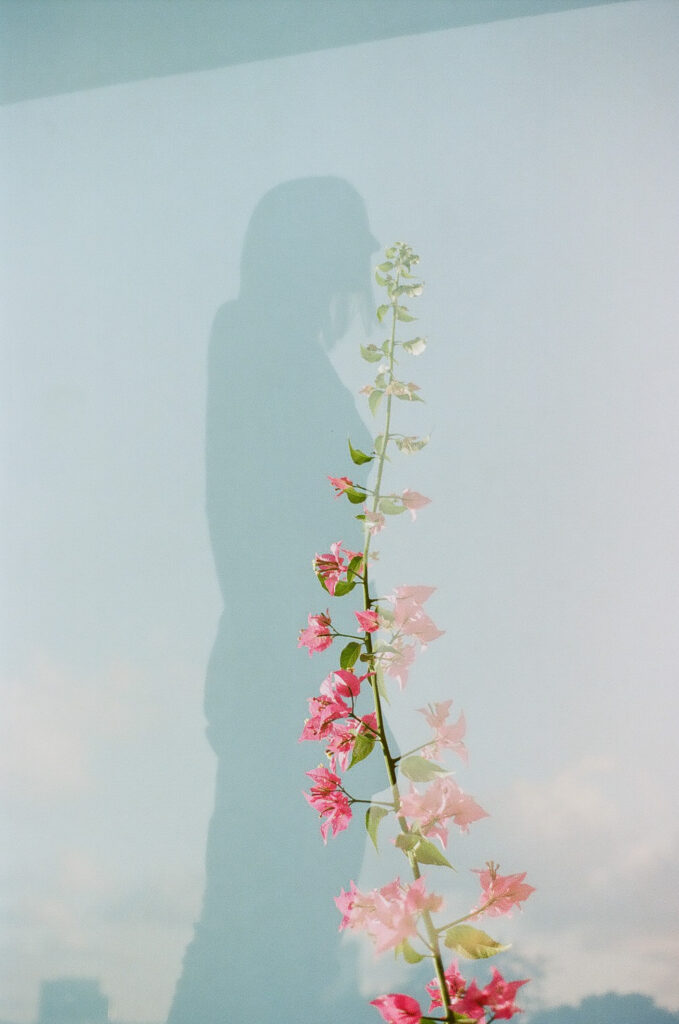
Merger, 2022
Olga Rerbo
Wind and Water
i.
ii.
iii.
iv.
v.
Birds have lightweight bones that are full of tiny air sacs, making them almost hollow. This, among other things, is what allows birds to fly.
Sandstone arches like the ones found in Utah are formed over hundreds of millions of years as water seeps into the rocks’ pores and erodes away bits of sand.
Osteoporosis, or porous bone, is a disease characterized by low bone mass and structural deterioration of bone tissue, leading to bone fragility.
It took Michelangelo over two years to sculpt David.
I love you from Zion National Park all the way to Mount Zion, Jerusalem and back. It doesn’t matter though because the timing is wrong. My timing is always wrong. Promise me then; promise me that you will meet me right back here in one hundred million years after wind and water and mostly time will have carved out a few more arches and after wind and water and mostly time will have carved us into different beings. Nature is a patient sculptor. Perhaps we will have decayed in a way so that our bones will be hollowed, just like birds’. I will be able to fly and I will leave you giant postcards and love letters and grocery lists on all the interstate highways in America and I will leave a trail of blue cornflowers back to me. Promise.
CURRICULUM VITAE BUT A CHESTNUT TREE
Daniel Revach
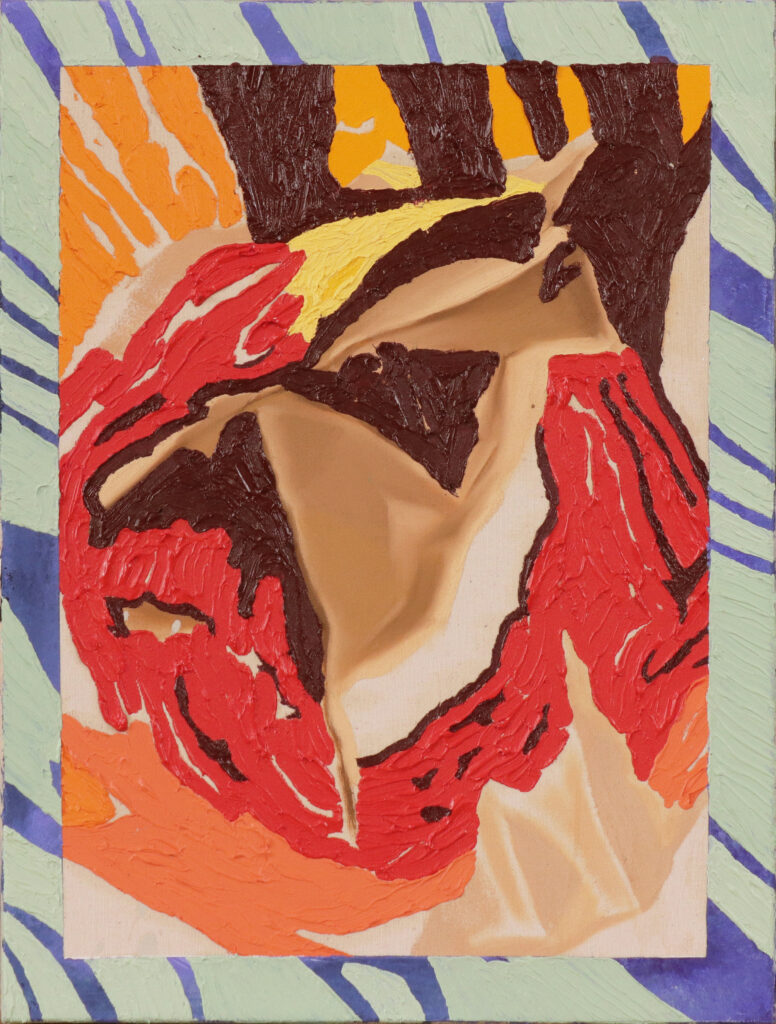
Blitz 2, 2022
Or Menaged
Water Night VIII, 2016
Lior Herchkovitz
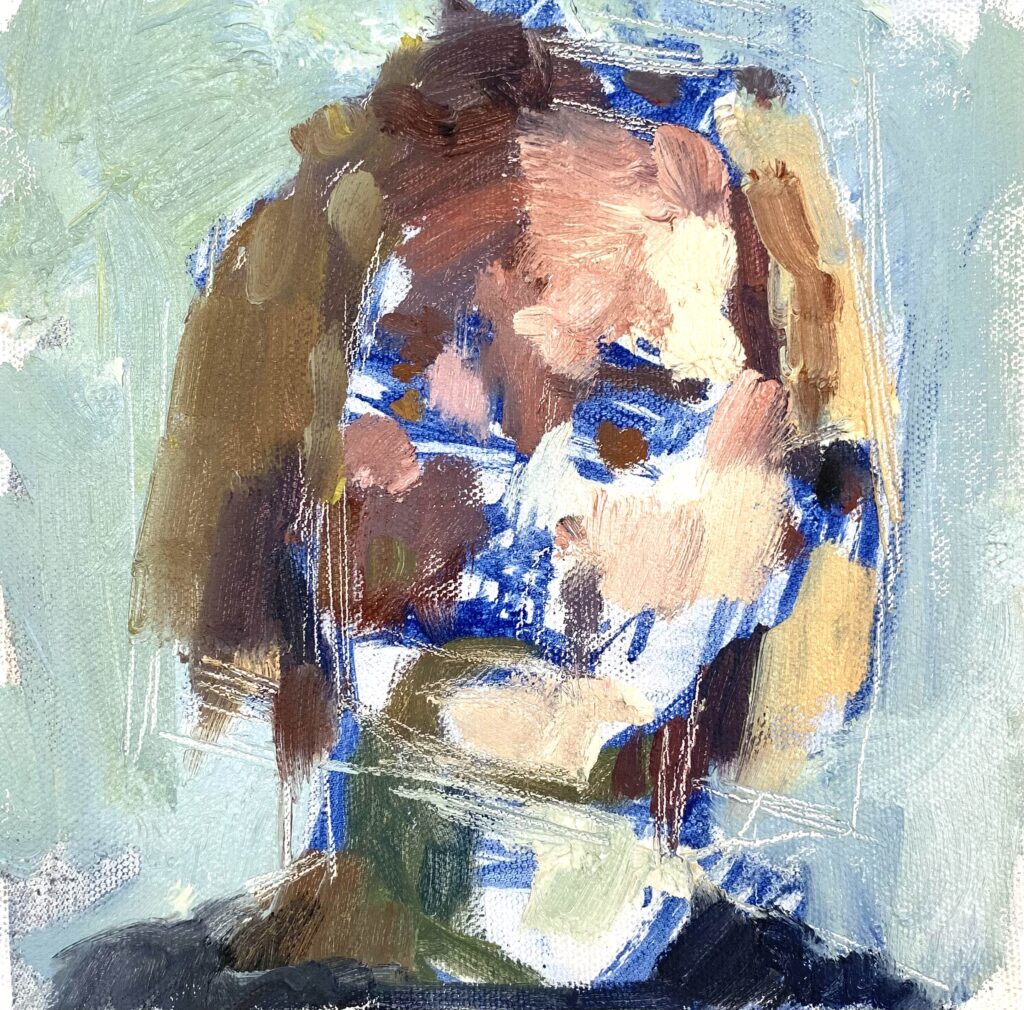
Will I Be Whole Someday?, 2023
Ekaterina Belukhina
On Recovery
Rachael Sevitt
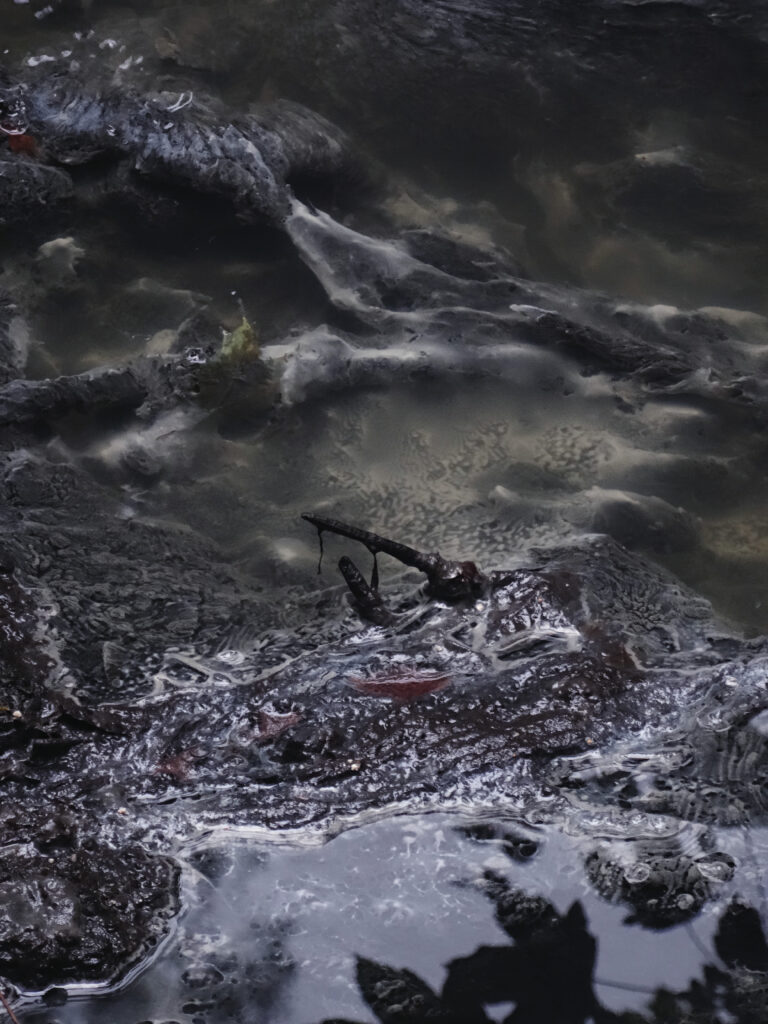
Stream of Despair, 2021
Oleg Leynov
Theologian
Ed Codish
When students ask me about God
and they do, leaning at my table at lunch
elbows propped on the pecan parquetry
or sprawled backwards on the caned chairs,
school gossip over and the roast veal eaten,
our wine drunk, the salads nibbled,
the world’s bounty cleared and put away –
Saturday afternoon, God means but isn’t,
I say and I explain.
They speak.
Books fell – history, philosophy, religion –
and curses stopped until they both
reshelved them. Then they tore
each other’s hearts out leaving those
to stain the carpeted floor.
“I don’t trust books,” she said,
“they just don’t help.”
His sister furtives out before lunch.
He is glad. In class, she dreamt of Amsterdam
and dope, went dumpster diving in Oakland.
Of God who isn’t I speak, and how God means.
My son’s poems are being published.
He has been straight for weeks, I think,
four months out of the hospital,
and understands God talk. Susann has heard
God talk before. She worries about me.
Well, there is no God and we obey Him,
our food kosher, the Sabbath’s laws observed
exactly. We welcome guests
always and well. Books line the walls –
poetry, theology, history, philosophy, drama –
and the carpets lie thick and undisturbed.
On all our faces fades a smear of God.
© WRITE-HAUS 2023
All rights reserved. No part of this publication may be reproduced in part or in whole without permission from the publisher.
The views and opinions expressed in the WRITE-HAUS magazine are those of the respective contributors and are not representative of the publication or its editors.
